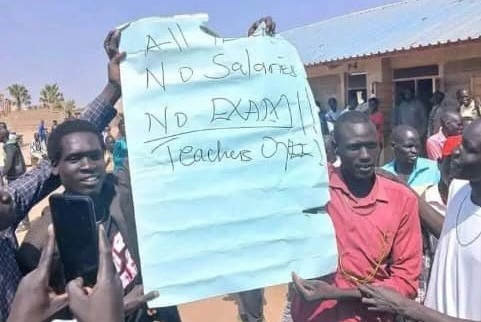The full-time government employed teachers in Gogrial West and Twic counties have refused to sit for the screening exams citing their unpaid arrears.
The South Sudan government has failed to address the salaries dispute that has remained unresolved for 14 months.
Officials said the boycott reflects the challenges within the education system.
The general feeling is that the full-time teachers who are unable to participate in screening would compromise the teaching standards and ultimately affect learning, giving an advantage to the private schools.
A Twic county teacher, Santino Wol, confirmed to Radio Tamazuj that some of his colleagues refused to take the exams.
“We went this morning to examination center and when the examiners brought the papers, some teachers grabbed and tore them demanding their salary arrears, while the rest went inside with them,” he explained
Makuei Akol from Gogrial West County also confirmed that the government teachers rejected the exams over their salary arrears.
“The full-time teachers for the government boycotted the exam papers as they need their arrears. Those who sat for the exams are the volunteers while others are those whose names are in the government payrolls but are not in the field of teaching,” he said.
The Warrap State Director for the Ministry of General Education and Instructions, Ker Bol, hinted that some teachers refused while others accepted to do the exams.
“Not all the teachers refused the exams in Warrap State. It was only the Gogrial center group, which chanted; “no salaries, no examination “, he said.
Twic County Commissioner Adhar Akok, said many teachers sat for exams though the exact number could not be established.
“The Rumbek university lecturers came on Sunday and carried out the assessment for the teachers. It is not a screening test because nobody would be left out for underperformance. It is meant to assess the ability of the teachers to deliver services successfully,” he said
“I have two centers in Turalei and Majak Aher but some teachers did not get the information due to poor network, while others had travelled,” he said.




